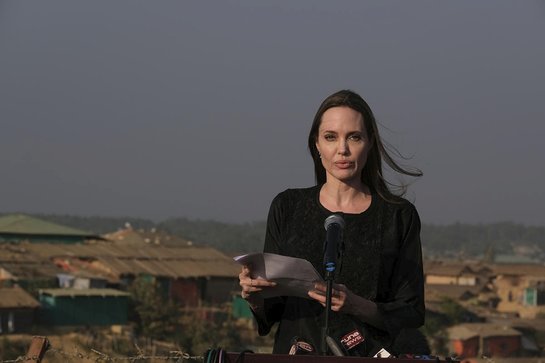UNHCR Special Envoy Angelina Jolie last week spoke at a press conference in Bangladesh’s Kutupalong refugee camp.

“The events that unfolded in the aftermath of August 2017 showed us the best and worst of humankind that exist in our world today,” she said. "In a matter of months, over 700,000 people were forced from their homes in Rakhine State into Bangladesh. A year and a half later, there are still refugees arriving today.
“While the death toll is unknown, reports suggest that many thousands have been killed since the violence broke out in Myanmar, including women and children. Everyone has been left traumatized.
“Bangladesh’s generosity in giving the Rohingya people a place of safety is a significant and visible gesture of humanity.
“The scale of the forced displacement is now so large that there are more than twice as many Rohingya living in exile than in Myanmar itself.
“And Cox’s Bazar, where we stand today, hosts the largest and most densely populated refugee camp, now home to more than 600,000 Rohingya refugees.
“All refugees are inherently vulnerable. But the Rohingya are not only displaced – they are stateless.
“They have been denied their most basic human right: citizenship in their country of birth. And some still won’t even call the Rohingya by their rightful name.
“It was deeply upsetting to meet the families who have only known persecution and statelessness their whole lives, who speak of being “treated like cattle”.
“I am therefore thankful that here in Bangladesh, Rohingya refugees have their existence recognized, and are being provided by the Government and UNHCR with documentation and proof of their identity – in some instances for the very first time in their lives.
“The Rohingya families I have met are no different from other refugees in one crucial respect: they want to be able to return home.
“And they have an absolute right to return home, but only when they feel safe enough to do so voluntarily and they know that their rights will be respected. I met a woman yesterday, a survivor of rape in Myanmar and she told me, “You would have to shoot me where I stand before I go back without my rights”.
“The responsibility to ensure those rights and make it possible for the Rohingya people to return to Rakhine State lies squarely with the government and the authorities in Myanmar.
“So I hope that they will recognize that this issue will not go away, just as we will not turn away from the Rohingya.
“I urge the Myanmar authorities to show the genuine commitment needed to end the cycle of violence and displacement and improve the conditions for all communities in Rakhine State, in line with the recommendations of the Rakhine Advisory Commission, and working together with UNHCR and others.
“A test and measure of any government is how they treat the most vulnerable people in society, and how they treat those who stand up for the vulnerable and speak out for the atrocities committed against them. The people responsible for human rights violations must be held accountable for their actions.
“While UNHCR is ready to support efforts to improve conditions, there has been very little progress on the ground. The Rohingya cannot return to Myanmar at this time.
“Until they can return, we have a collective responsibility to ensure that they can live dignified lives here in Bangladesh.
“This week I have witnessed the remarkable and global humanitarian response to date. And while it is clear that lives have undoubtedly been saved, and the Rohingya have been able to live with a sense of dignity, there are still challenges.
“In particular, a generation of Rohingya children are still without access to the education that they deserve, and which many were deprived of their right [to] for far too long in Myanmar.
“So I am here to see what more can be done to ensure Rohingya children can gain education with recognized qualifications that they need to retain a clear vision for their futures, and, when conditions allow, rebuild their communities in Myanmar.
“I also met yesterday some of the many survivors of sexual and gender-based violence, including mass rape. Nearly two years after the beginning of this emergency, there is still a worrying gap in psychosocial services available for refugee survivors. This gap urgently needs to be addressed.
“Bangladesh is a generous country rich in culture and history, but with limited resources. And it cannot be left to shoulder the responsibility of hosting Rohingya refugees alone. So I urge the international community to continue to provide the humanitarian aid necessary to meet the needs of the refugees and support the communities so generously hosting them.
“Finally, and more importantly, to the Rohingya refugees, I want to say I am humbled and proud to stand with you today.
“You have every right to live in security, to be free to practice your religion and to coexist with people of other faiths and ethnicities. You have every right not to be stateless, and the way you have been treated shames us all.
“What is most tragic about this situation is that we cannot say we had no warning: It is the result of four decades of persecution and discrimination, which have gone unaddressed for far too long.
“It reminds us why there are over 68 million displaced people worldwide: because we do not succeed in acting collectively to prevent conflict, but find ourselves simply trying to manage its unmanageable human consequences.
“The Rohingya crisis is therefore emblematic of a much wider problem. But it is also a powerful example of what happens when people around the world, and across societies, come together in response to a cause greater than themselves, And I pray that generosity and support continues for the Rohingya and their families.”





